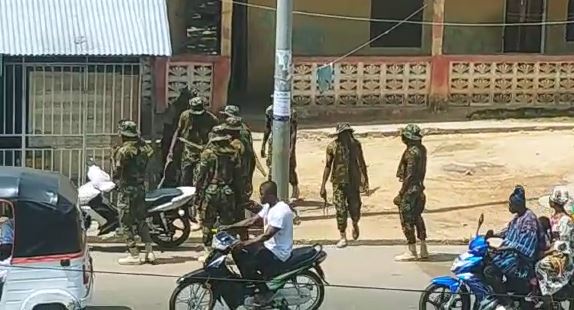The escalating level of military brutality against people in Ghana, a normally peaceful West African country, is alarming. These incidents, which are growing more common, highlight the critical need for continued efforts to promote accountability, transparency, and human rights respect within the military. The purpose of this article is to give full information on the subject, including historical context, steps done by the Ghanaian government and armed services, and the critical role of proactive measures in addressing and preventing military brutality.
While Ghana’s history has been mostly peaceful, there have been episodes of military brutality that have had serious implications. For example, in 2017, a well-known case involved a military commander and his comrades severely beating a citizen in a public place, an incident that was captured on camera and generated public anger. The officer was later arrested and discharged from the force. In another example in 2018, a military officer allegedly assaulted a citizen, killing him. The officer was arrested and charged with murder immediately. Four youths aged 13 to 16 were detained in June 2018 for stealing a laptop. Ghana Armed Forces stripped them naked and battered them, causing significant injuries. The police did not conduct an investigation, and the criminals went unpunished. The Ghana Commission on Human Rights and Administrative Justice suggested financial compensation for the children and prosecution of the soldiers, but nothing was done about the mother’s treatment.
Others are in Ashiaman, and the current situation is in Garu and Tempane. The list is enormous. While these are reported occurrences, they serve as a reminder that military wrongdoing can occur even in relatively calm countries.
The Ghanaian government has consistently condemned military brutality and taken attempts to solve the problem. They have launched investigations into such instances in order to hold those responsible accountable for their conduct. However, it is clear that previous steps may not have been effective enough in preventing the return of military cruelty.
Recognizing the critical necessity of combating military brutality, the Ghana Armed Forces have taken tremendous steps to prevent such instances and to build a culture of accountability and respect among its members. These efforts include aggressively encouraging citizens to report cases of military misbehavior without fear of retaliation, developing systems for lodging complaints against military personnel, and including human rights training into the curriculum of their staff. These efforts seek to foster an environment in which the military understands and respects civil freedoms, hence reducing instances of brutality.
To rebuild public faith and confidence, authorities must ensure that any efforts taken to reduce military brutality are made public. This openness will reassure the public that actions are being made to hold those who are responsible accountable. Continued efforts are required to promote awareness while also building trust between people and the military. Enforcing severe measures and fostering accountability, transparency, and human rights respect would help to create a safer and more accountable environment for all citizens.
In conclusion, while Ghana has a mostly peaceful past, there have been instances of military brutality against people. The government and military forces must be watchful and take decisive action to address and prevent similar situations. Ghana may seek to reduce incidents of military violence, ensure justice for victims, and eventually promote a safer and more accountable society for all of its citizens by actively supporting accountability, transparency, and respect for human rights.
By Evans Mawunyo Tsikata – BBA, LLB, MEd, LLM





